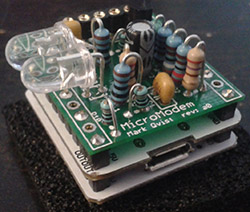 Them kids with those Arduinos don’t know what they’re missing. A serial connection is just too easy, and there’s so much fun to be had with low bandwidth modems. [Mark] made the MicroModem with this in mind. It’s a 1200 baud AFSK modem, capable of APRS, TCP/IP over SLIP, mesh network experimentations, and even long-range radio communication.
Them kids with those Arduinos don’t know what they’re missing. A serial connection is just too easy, and there’s so much fun to be had with low bandwidth modems. [Mark] made the MicroModem with this in mind. It’s a 1200 baud AFSK modem, capable of APRS, TCP/IP over SLIP, mesh network experimentations, and even long-range radio communication.
As the MicroModem is designed to be an introduction to digital wireless communication, it’s an extremely simple build using only 17 components on a board compatible with the Microduino. The software is built around something called MinimalProtocol1, a protocol that will be received by all other listening stations, features error correction, and automatic data compression. There’s also the ability to send TCP/IP over the link, which allowed [Mark] to load up our retro site at a blistering 1200 bps.
The code is extremely well documented, as seen on the Github for this project, with board files and even breadboard layouts included. [Mark] has three PCBs of his prototype left over, and he’s willing to give those out to other Hackaday readers who would like to give his modem a shot.















I’d love to give it a shot.
Nice! Send me an email telling me where you want it sent and I’ll mail you a board :D
Sent!
I’d like to give it a shot too
As above, tell me where you want it!
This sounds pretty awesome, I’d love to try it out!
And the same for you :)
I can’t seem to find your email anywhere.
I’d give it a shot. Would love to see this with Ham radio
Sounds cool but I think HaD killed his server :P ERROR 504.
Yeah, it did, getting it back up now ;)
Just picking apart the bits he finds fun is the most interesting. Speaker as a probe is interesting. It is more interesting as a logic probe. The use of the heatshrink library is verry intersting to me as I find playing around with un-encrypted ssh at 1200 bps on ax.25 fun, a better compression method makes more fun.
Let’s put lasers on this thing !
Or use it between graphics calculators through the serial port to communicate in class.
Nice build.
This project would be a great fit for High altitude balloon projects, or model rocket telemetry. You don’t need gobs of bandwidth for either of those, and cell, NRF chips, or Zigbee dont have the range capability for this kind of stuff. The only other options are costly rf modem modules, and even then, they don’t have that great of range either most of the time. Definitely going on my bucket list of things to try or leverage in the future! My only beef is using BERtos libs to build it, but that could be worked around too I suppose if one wanted to put forth the effort… Great project!
Yeah, I also would like to liberate it entirely from the BertOS libraries, which is definitely within reasonable reach, and is on my todo for this project. When I have another extended break from work, I will probably take a coding-vacation to do that :)
Actually I have put in that effort now, and there’s an early version completely free of BertOS libs available over at the forum on my site :)
Would you have another board to spare? I would like to build one as well.
I would like to try out one of these boards too. I work with things directly related to this so my coworkers would find this interesting as well.
I would like to try out one of these boards too. I work with things directly related to this so my coworkers would find this interesting as well.
Edit: Didn’t know it included my name.
you could call my c64 bbs with it :) udi.dyndns.tv port 6400 :)
hey, hi, excellent work here, i´ve been trying to develope my version of it on an Arduino UNO but with no success, it seems i am missing where the bits output is meassured, and other things in between.
would somebody like to help me a little bit?.
Thanks